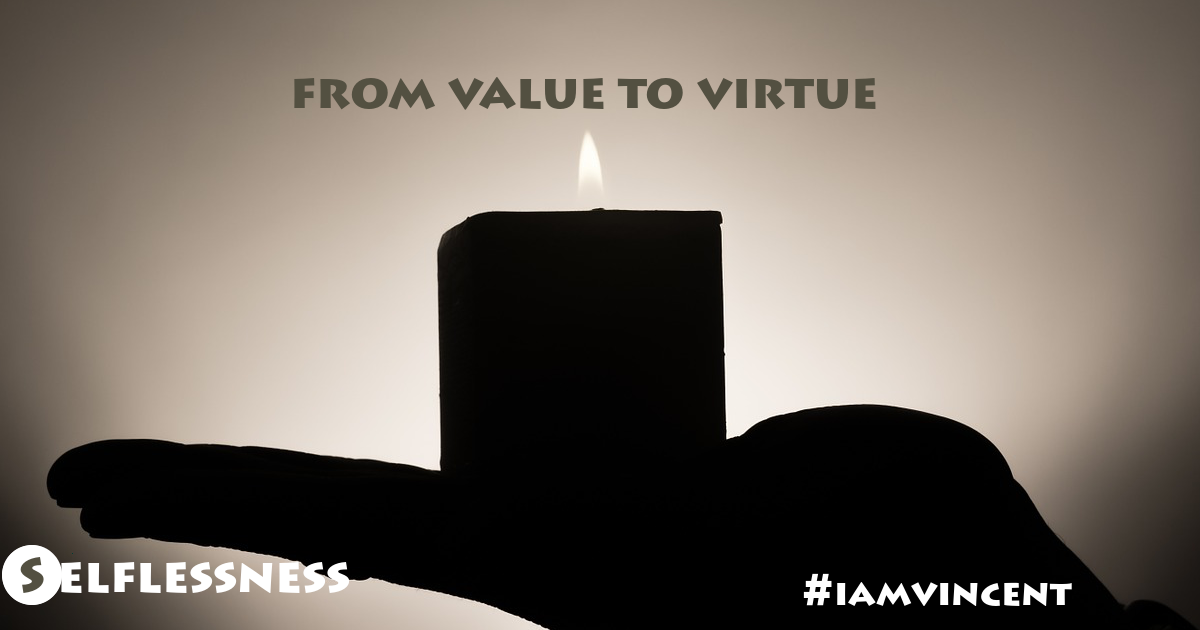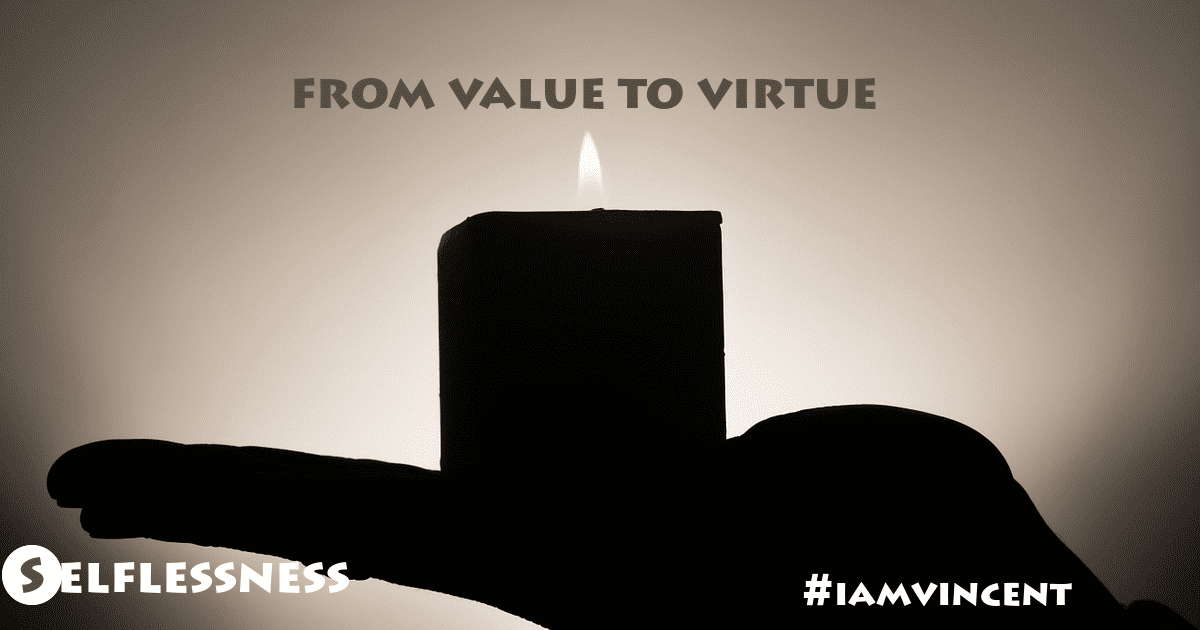From Value to Virtue: Selflessness
To say #IamVincent means to live a life of virtue. Actually, it means to live a life of five essential virtues. The fourth is Selflessness: the virtue of generosity.

In the midst of the present cultural context in which we find ourselves, the Rule of the Saint Vincent de Paul Society calls our attention to the fact that selflessness is one of our essential virtues. In the not too distant past, selflessness was certainly valued. We can recall when we were invited to make some sacrifice “for the missions” or “for the health of some infirm individual” or for some other worthy cause. We can also remember that during the season of Lent we were invited to engage in some penitential sacrifice. These practices were often associated with sadness, mourning and deprivation.
Today our perspective has changed and we find ourselves in the midst of a paradoxical reality. On the one hand, the traditional attitude with regard to sacrifice has been set aside and many of the former practices have been trivialized. On the other hand, another group of practices has appeared and these require much disciplines: diet, sports, various forms of physical exercise, competitions, etc. This leads us to think that the motivations are quite distinct: sacrifice is no longer engaged in to honor God or to control one’s passions … rather one engages in these modern disciplines in order to achieve a better physical appearance or to attain better health. In whatever case, however, sacrifice (even under a different name) remains valid … but we must focus on the meaning that we ourselves give to the practice of sacrifice which leads to selflessness.
The Rule limits the scope of “selflessness” when it states that the cultivation of that virtue involves dying to our ego with a life of self-sacrifice; members share their time, their possessions, their talents and themselves in a spirit of generosity (Rule, 2.5.1). Therefore, we are dealing with self-control and domination of oneself and consequently, placing oneself at the service of others. The members die to self in order to rise again in the life of others. In that context the virtue of selflessness is closely related to the virtue of mortification and therefore we place the well-being of others ahead of our own well-being. We are not dealing here with selflessness for the sake of selflessness or with renunciation for the sake of renunciation, but rather we are involved with putting aside that which is good in order to attain that which is better, in other words, to shift the focus from self to others. All of this will naturally involve us in sacrifice, discipline, and asceticism.
Here we recognize the fact that sacrifice in the Christian perspective is quite distinct from the manner in which it is understood in other religions. In so many of those religions sacrifice is viewed as an offering that human beings have to render to God. Therefore, produce from the harvest and/or animals (and in some cases, even other human beings) are offered. This practice was prevalent among the members of the Jewish community (Exodus 12:5-7; Leviticus 1:3-17) even though the prophets proclaimed that obedience is better than sacrifice and submission better than the fat of rams (1 Samuel 15:22). God does not desire offerings or sacrifices consumed by fire, but >let justice surge like water and goodness like an unfailing stream (Amos 5:24).
In the same line of prophetic thinking, we hear Jesus proclaim: I desire mercy, not sacrifice (Matthew 9:13). In the letter to the Hebrews the author refers to Jesus as the one who sacrificed himself on the cross in order to redeem all people (Hebrews 10:11-14). In this same letter all Christians are exhorted to be generous and to share with others because those are truly the sacrifices that are pleasing to God … do not neglect to do good and to share what you have; God is pleased by sacrifices of that kind (Hebrews 13:16).
Our Rule and the letter to the Hebrews see a relationship between sacrifice and generosity. Sacrifice as mere deprivation has no meaning … such an interpretation is more proper to a form of philosophy that holds as suspect material goods and those things that would enhance the body. Sacrifice has meaning for Christians only when viewed from the perspective of solidarity with Jesus as he loving handed over his life to the Father … thus encouraging us to hand over our own lives for the well-being of others. Sacrifice, therefore, implies mortification, solidarity, service, generosity and love.
Vincent understood sacrifice from that perspective and we see that in the manner in which he placed sacrifice and mortification in a relationship with the search for and the fulfilment of the will of God, with the practice of prayer, with strengthening one’s motivation, with the ability to support one another, with a willingness to accept limitations and various inconveniences, with respect for others and with charity.
Today we see in our society so many people who have the ability to make sacrifices for the sake of the greater good. Work and discipline are often viewed from this perspective. From the perspective of Christian faith, the Vincentian vocation and the spirit of the Rule, let us attempt to purify our motives and orient our various spiritual practices. In this regard, let us focus on some aspects that can express the authenticity of our practice of selflessness:
- Cultivate fidelity to our Christian faith and to our Vincentian vocation through the practice of prayer and frequent participation in the Eucharist;
- Cultivate the habit of putting aside one’s own self-interest in order to focus on the concerns of others, especially those persons who are poor;
- Develop an ability to set aside one’s hobbies and recreation time in order to enter more deeply into solidarity with others and help people in their time of need;
- Develop a simple and austere lifestyle in order to be able to share more resources with those who are poor;
- Treat others with respect and accept the realities of diversity and pluralism;
- Learn how to give in to others … aware of the fact that in doing this we are truly listening to others;
- Develop the habit of channeling all of one’s energy on behalf of the well-being of others.
Let us, then, engage in this practice of selflessness from the perspective of a love of the crucified Jesus and let us make real this practice in our service on behalf of our brothers and sisters who are poor.
Translated: Charles T. Plock, CM







0 Comments